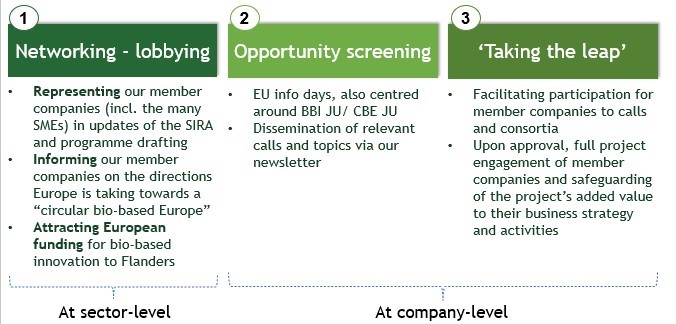Emma Sidgwick, from Flanders’FOOD, partner of the BIOSWITCH project

Emma Sidgwick, from Flanders’FOOD, partner of the BIOSWITCH project
What’s your role within the BIOSWITCH project?
Flanders’ FOOD is the spearhead cluster for the agri-food industry in Flanders. In that capacity, it is mandated and funded by the Flemish government, via its agency Flanders Innovation & Entrepreneurship (VLAIO), to take up a pivotal role in addressing the field of the bioeconomy in the innovation landscape of the agri-food sector. This also translates to our role in the BIOSWITCH project.
Flanders’ FOOD is one of the four cluster partners in the BIOSWITCH project, whose main role is to establish and nourish the link between the project’s objectives and its final beneficiaries, i.e. brand owners as well as relevant industry players from their respective membership bases. As a cluster organisation, our first task is to safeguard the project’s added value to the business strategy and/or activities of our member brand owners that decided to take up an active role in the project. In this project, this mostly implies working closely together with one of the four ‘major brand owners’ involved, with whom the project consortium tested, validated and ultimately co-created the BIOSWITCH Toolbox.
The cluster organisations involved in this project, also take up an instrumental role in the broader dissemination and regional replication of the final iteration of the BIOSWITCH Toolbox. That is, by sharing final outcomes and findings, but also by assessing what customisation of the Toolbox is required to cater to the needs of different regional brand owners that wish to use the Toolbox in their individual bio-based transition journeys?
These roles are indeed quite aligned with why and how BBI JU (now CBE JU) sees to engage clusters in the further development and deployment of the bioeconomy: “Clusters are closer to territories and can make the necessary link between the regions and the bioeconomy / the BBI initiative”
Besides these cluster-specific roles, Flanders’ FOOD has led the project activities that dealt with the validation of the communication material type tools of the BIOSWITCH Toolbox specifically.
What do you offer as a cluster?
It is Flanders’ FOOD’s mission to support the Flemish food industry via research and innovation in retaining and strengthening competitiveness on both the local and foreign markets. Via innovation, Flanders’ FOOD supports food companies in taking on social challenges, such as those in the domain of nutrition and sustainability.
Concretely, we work on four strategic action domains. On the one hand, two knowledge-driven action domains that must increase companies’ knowledge and, on the other hand, two business-driven action domains that must help them with creating new products, processes and concepts that will stimulate their economic growth.
Hence, when we involve our member companies in BBI-JU funded projects such as the BIOSWITCH project, we want to deliver on our strategy throughout bio-based themes that are relevant but often a ‘stretch’ for them. Put differently, we want to make them explore new horizons in both knowledge acquisition at industry level as well as in creating new value chains or value chain interlinkages at company level within but also beyond the agri-food sector.

What can you specifically offer to brand owners within your region?
Flanders’ FOOD’s four strategic domains each contain explicit research and innovation actions, which are concretised into corresponding service portfolios. These services are available to our members, mostly companies from the food processing industry including also brand owners.
Within the domain Lead in Knowledge, Flanders’ FOOD draws up various innovation roadmaps, in close exchange with cluster members, which eventually lead to (mutual) knowledge development. These roadmaps offer the conceptual backdrop against which yearly many collaborative R&D&I projects, often funded by Flanders Innovation & Entrepreneurship (VLAIO), get initiated with the support of Flanders’ FOOD. Roadmaps specifically geared towards bioeconomy-related topics are the roadmaps around the “Protein shift”, “By-Products/ Side-stream valorisation” (under development) and “Food packaging of the Future” in collaboration with Pack4Food.
Within the domain Lead to Knowledge, the cluster disseminates the available state-of-the-art and newly generated knowledge to a wide group of food companies. Newsletters and events thus often cover topics that could be relevant for brand owners from the food industry that seek to adopt bio-based approaches in their products and (especially) packaging.
The domain Accelerate Efficient & Effective Innovation puts the focus on supporting businesses in translating knowledge into concrete products, processes and (new) concepts. Services included under this domain are e.g. “Vraag@” (“Question@”) for all food-industry related questions and access to our national and international network of businesses, knowledge institutes, federations, clusters and authorities; referral to a network of pilot infrastructure for product and process testing and validation; matchmaking services in the context of start-up & corporate win-win collaborations… Again, these services are available for all brand owners from the food industry with bioeconomy-related questions and requests.
Within the domain Cross/Create Value Chains, Flanders’ FOOD brings together stakeholders to achieve an open innovation culture and create win-win situations, fill in gaps and find new business opportunities. In relation to the field of the bioeconomy and biobased industry, within this domain, our services mainly consist of engaging our member companies in relevant EU-funded projects, which enable them to access and tap European-wide (open) innovation networks for the development of value chain-driven collaborations and partnerships. To find and foster the connection between European funding schemes and the innovation needs of our member companies, we work on three different pillars:

Where do you think the main change should be produced to boost bio-based alternatives in replacement for fossil-based ones?
Taking the point of view of more established brand owners in our membership base, Flanders’ FOOD believes that three critical leverage points could trigger a more systemic transition towards the adoption of bio-based approaches. First, brand owners should receive clear and scientifically substantiated evidence on the positive sustainability impact of bio-based transition journeys. This, in turn, could build the rationale behind value-based pricing strategies. Second, brand owners should receive support from networked intermediaries (such as clusters) to connect with and ‘funnel’ critical bio-based value chain stakeholders e.g. market-ready suppliers, material developers, or researchers. Third, brand owners should be supported in adopting effective strategic communication strategies that accompany their bio-based transition journey efforts, to make sure that efforts and investments also result in value capturing for the company.



